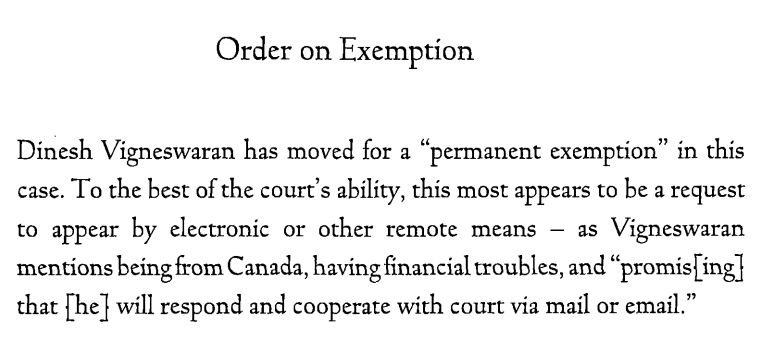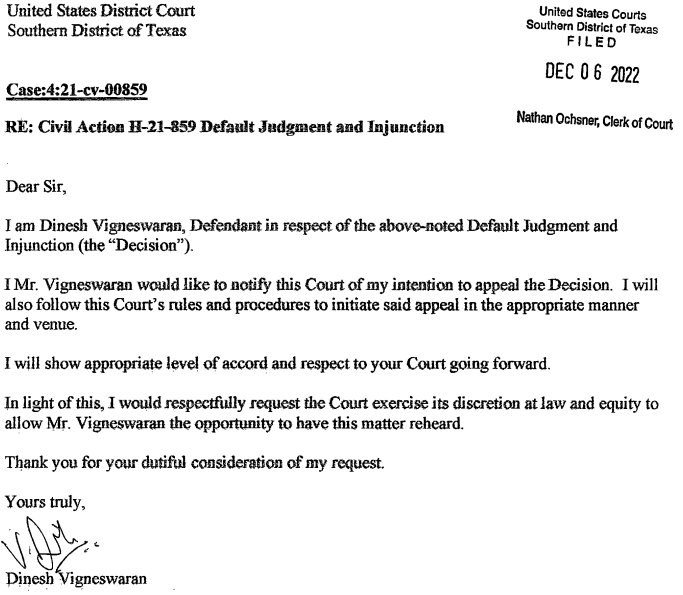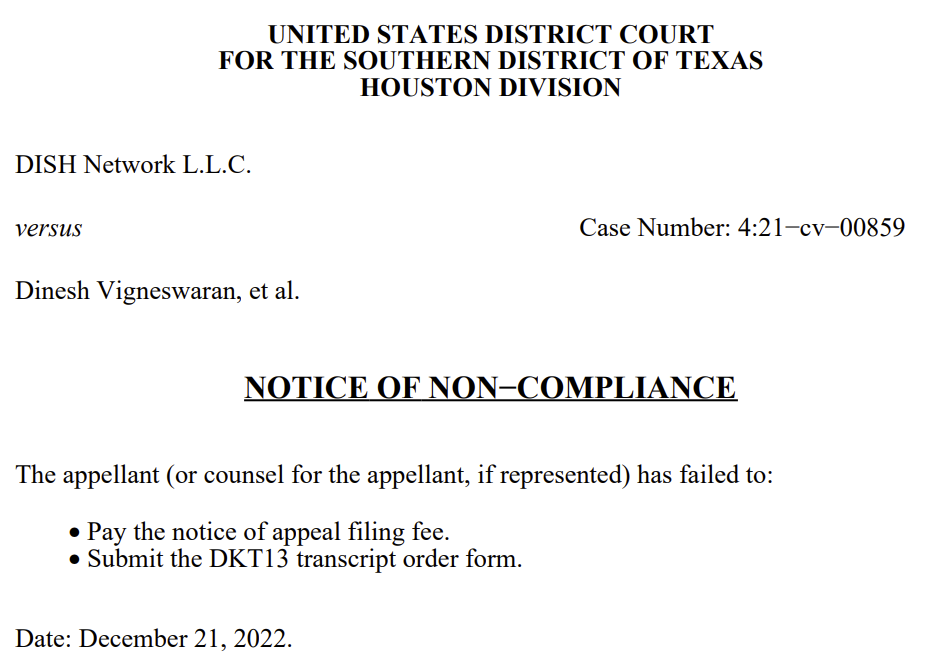In March 2021, DISH Network filed a copyright infringement lawsuit against pirate IPTV provider ChitramTV, demanding $31 million in damages.
The DISH lawsuit targeted the entire service, but attention quickly focused on Dinesh Vigneswaran of ChitramTV Canada, who allegedly sold subscriptions via Chitram.ca.
DISH said that during a telephone call with one of its investigators, Vigneswaran confirmed his involvement with ChitramTV when he said he had 60 resellers and a warehouse in the United States filled with pirate boxes.
DISH couldn’t identify anyone else in its investigation, so when Judge Lynn N. Hughes handed down a $31m judgment at a Texas district court in November 2021, Vigneswaran became the most obvious target for DISH’s collection team. For a few moments, at least.
After finding that Vigneswaran had answered the complaint at the 11th hour, the default judgment against him was withdrawn. The default against the still-unidentified parties remained in place, but Vigneswaran had a golden opportunity to turn things around.
Let The Chaos Begin
From the moment Vigneswaran began corresponding with the court, the outcome seemed all but inevitable. He told the court that he’d received a summons in May 2021 but believed the letter was a “fraudulent scam” and since he was the potential victim, he ignored it.
The Canada-resident then admitted to having a business relationship with ChitramTV, albeit one he was forced into. As the former head of sales at Lyca TV, he’d sold legal TV packages to friends and family, but when they underperformed, Vigneswaran felt that to “safeguard” his name and reputation, he should compensate them with ChitramTV’s pirate packages.
In a submission to the court dated February 2022, Vigneswaran denied being the operator of ChitramTV and presented a list of people he’d never spoken to. Referring to himself in the third person, he addressed Judge Lynn N. Hughes as “My Lord” to explain that the court had no jurisdiction and DISH was victimizing him as part of a vendetta.

In conclusion, Vigneswaran told the court that DISH was “not entitled for any relief” so the lawsuit should be dismissed. While he said he would be “available to answer and cooperate (legit) with the plaintiff,” the court should grant him a “permanent exemption.”

Other letters sent to the court (and the law firm representing DISH) spoke of a “malicious prosecution,” warning that if it didn’t stop, “recovery of 2 Million Canadian Dollars on account of damages” could be a potential outcome.
Nine Months Later….
After several months and numerous confusing submissions that elaborately and repetitively took the case nowhere, on November 15, 2022, Judge Hughes’ patience finally ran out. DISH previously called for Vigneswaran to be held in contempt and sanctioned, and that’s exactly what happened.
“Throughout this litigation, to label Dinesh Vigneswaran as troublesome would be an understatement. He has repeatedly failed to comply with the Court’s instructions and has made a mockery of basic, integral judicial processes,” Judge Hughes wrote.
“In light of Vigneswaran’s conduct, Plaintiff DISH Network, LLC has moved for the defendant to be held in contempt and sanctioned. This motion succeeds.”
Describing Vigneswaran’s disrespect as “rampant from its very onset,” Judge Hughes listed events that led to the defendant being held in contempt.
– Failing to respond to the initial complaint
– Eventually answering a month after entry of default
– Reminding the court of his “full exemption” via a request to “completely exempt him”
– Making a “mockery” of discovery with “boilerplate made-up objections”
– Filing objections “that have little to no basis in law or even common sense”
– Failing to produce most documents after a final warning on discovery compliance
– Unilaterally redacting documents so as to make them “virtually useless”
– Describing the motion for contempt as “unlawful, extralegal, and illegal”
“The course of this litigation reveals Vigneswaran’s callous disregard for the American court system. His failure to comply with explicit instructions has been alarming, and the Court has reached its tolerance,” the Judge continued.
“DISH has not quit, and this Court is unaware of a legal system wherein refusing or feigning cooperation makes a lawsuit magically disappear.”
No Reason For Defendant to Rack Up Monetary Sanctions
Noting that the case may as well be in its infancy due to the defendant being “stubbornly dedicated to keep producing rubbish,” Judge Hughes saw no reason for Vigneswaran to rack up monetary sanctions or for DISH to incur more costs.
A default judgment would send the right message but not at the maximum level of damages requested by DISH. Vigneswaran’s infringement had been willful, and he’d been far from cooperative, but the Court acknowledged he was just one part of a much bigger operation.
“[T]he maximum of $150,000 per registered work would be excessive, particularly considering the lack of proffered actual damages and that Vigneswaran is only one individual who served as but a cog in the machine,” the judgment reads.
“DISH will take from Vigneswaran $ 50,000 for each of the 19 registered works, to the tune of $950,000, plus 4.73% post-judgment interest.”
After Digging a $1m Hole, It’s Time to Keep Digging
The judgment was hardly a good outcome for Vigneswaran but after reading all of the filings in the case, there’s little doubt it could’ve been worse. Surprisingly, the possibility of an even worse outcome was kept alive thanks to a subsequent letter addressed to the court.

Vigneswaran’s appeal is currently listed for hearing at the Court of Appeals for the Fifth Circuit, but what that might hold in store is difficult to predict.
The immediate problem is more clearly defined, however.

The order for default judgment can be found here (pdf)
From: TF, for the latest news on copyright battles, piracy and more.
Source : IPTV Seller Exasperates Judge, Digs Himself a $1m Hole, Keeps on Digging










